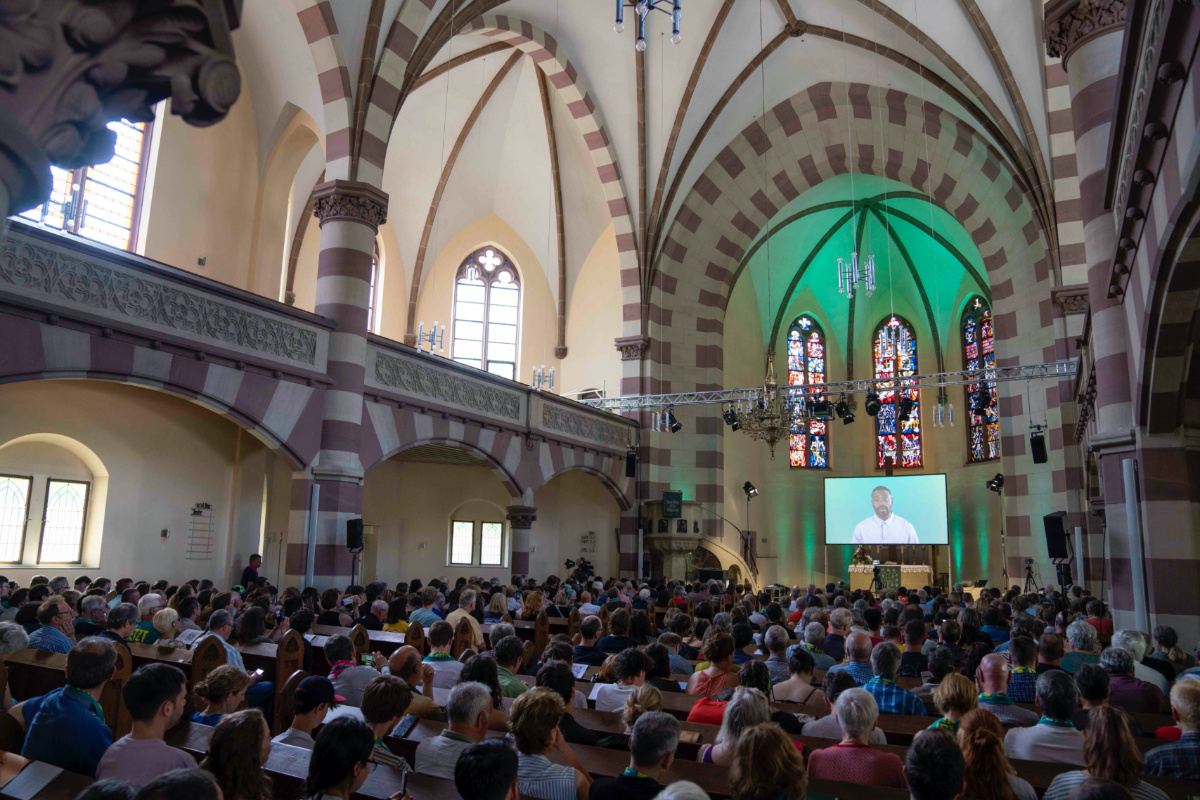
JOANNE M PIERCE, professor emerita of religious studies at College of the Holy Cross, says, in an article first published on The Conversation, explains what the limitations are…
When several hundred Lutherans in Bavaria, Germany, attended a service on 9th June, 2023, designed by ChatGPT, the program not only selected hymns and prayers, but also composed and delivered a sermon, delivered by an avatar on a big screen.
Indeed, programs like ChatGPT, that can produce a sermon in seconds, might seem attractive to busy clergy. But several religious leaders, including rabbis serving Jewish congregations as well as Christian Protestant pastors, have conflicting feelings about utilizing chatbots in preparing sermons.

People attend a church service in Nuremberg, Germany, on Friday, 9th June, 2023. Hundreds of German Protestants have attended a church service in Bavaria that was generated almost entirely by artificial intelligence. The service was created by ChatGPT and Jonas Simmerlein, a theologian and philosopher from the University of Vienna. The ChatGPT chatbot, personified by different avatars on a huge screen above the altar, led the more than 300 people through 40 minutes of prayer, music, sermons and blessings. PICTURE: AP Photo/Matthias Schrader.
There may be several reasons for being cautious. From my perspective, as a specialist in Catholic liturgy and ritual, the most important critique has to do with true intent of preaching – to offer insight and inspiration on the human experience of faith.
Historical practice
In the early centuries of Christianity, preaching was largely reserved for bishops, considered to be the successors to Jesus’ apostles. During the Middle Ages, priests were also allowed to preach, although their chief responsibility was to say the Mass – ritually consecrating the offerings of bread and wine – especially on Sundays.
“Preaching as a human activity has a special meaning for Catholics – and most Christians – because they believe that Jesus Christ is the incarnate Son of God, who came into human life to save all of humanity from their sins and gave His apostles the commandment to preach the Gospel about this ‘good news’ to people of all nations. “
In some religious orders, priests became famous traveling preachers, although much of the time they were preaching in other settings, not during Mass. The Franciscan and Dominican orders, for example, would send priests to preach on the streets and in city centers, traveling from town to town in fulfillment of this ministry.
During the next few centuries, preaching brief sermons or homilies became increasingly important during the celebration of Sunday Mass. The Second Vatican Council, convened in 1962, took a fresh look at all the church’s rituals and stressed the role of preaching at worship, especially at Mass.
These principles have been reaffirmed in more recent documents that guide Catholic preachers when writing a sermon. In essence, preaching was always believed to be a human activity grounded in faith.
We rely on our readers to fund Sight's work - become a financial supporter today!
For more information, head to our Subscriber's page.
Insight and inspiration
Preaching as a human activity has a special meaning for Catholics – and most Christians – because they believe that Jesus Christ is the incarnate Son of God, who came into human life to save all of humanity from their sins and gave His apostles the commandment to preach the Gospel about this “good news” to people of all nations.
In the decades since Vatican II ended in 1965, preaching in the Catholic tradition has been emphasised as a “primary duty” of all priests.
The sermon is meant to inspire people in their ordinary lives of faith. The preacher must spend time in preparing the sermon, but this does not just mean compiling theological quotes or doing research on the history of the Bible.
A good sermon is not just a classroom lecture. In fact, several contemporary popes have stressed that the language of sermons should avoid technical or obscure terminology. In 1975, Pope Paul VI wrote that the language of preaching should be “simple, clear, direct, well-adapted” for the congregation in the pews. And in 2013, Pope Francis echoed these same words in his observation that “simplicity has to do with the language we use.”
But preaching is not just about offering pious mottoes or generic religious formulas. The preacher’s experience, insights and emotions all come into play when composing the homiletic text.
The preacher is not simply offering good advice, but speaking out of personal reflection in a way that will inspire the members of the congregation, not just please them. It must also be shaped by an awareness of the needs and lived experience of the worshipping community in the pews.
Use with caution
In practice, chatbots might help clergy save time by finding sources and compiling relevant facts, but the results would need to be checked for errors. Chatbots have been known to make some factual blunders or invent sources completely.
Above all, I believe chatbots, as of now, are not capable of preparing a text suitable for being offered as a sermon. From what we know about chatbots, they cannot know what it means to be human, to experience love or be inspired by a sacred text.
Perhaps Baptist pastor Hershael York, Dean of the School of Theology at The Southern Baptist Theological Seminary, has put it best. He has noted that the ultimate failure of a chatbot’s sermon lies in the fact that it “lacks a soul.” Without that empathetic consciousness, a chatbot-composed sermon cannot include genuine insights based on personal spiritual experience. And without that essential element of embodied human awareness, true preaching is simply not possible.![]()
Joanne M Pierce is professor emerita of religious studies at College of the Holy Cross. This article is republished from The Conversation under a Creative Commons license. Read the original article.






